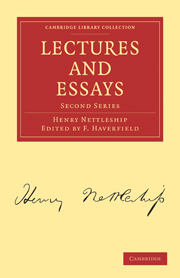Book contents
- Frontmatter
- PREFACE
- Contents
- Dedication
- MEMOIR BY MRS. NETTLESHIP
- I JOHAN NICOLAI MADVIG
- II THE ORIGINAL FORM OF THE ROMAN SATURA
- III LITERARY CRITICISM IN LATIN ANTIQUITY
- IV THE HISTORICAL DEVELOPMENT OF CLASSICAL LATIN PROSE
- V LIFE AND POEMS OF JUVENAL
- VI THE STUDY OF LATIN GRAMMAR AMONG THE ROMANS IN THE FIRST CENTURY A. D.
- VII ON THE PRESENT RELATIONS BETWEEN CLASSICAL RESEARCH AND CLASSICAL EDUCATION IN ENGLAND
- VIII THE MORAL INFLUENCE OF LITERATURE
- IX CLASSICAL EDUCATION IN THE PAST AND AT PRESENT
- X AUTHORITY IN THE SPHERE OF CONDUCT AND INTELLECT
- XI THE RELATIONS BETWEEN NATURAL SCIENCE AND LITERATURE
- BIBLIOGRAPHY
- INDEX
VI - THE STUDY OF LATIN GRAMMAR AMONG THE ROMANS IN THE FIRST CENTURY A. D.
Published online by Cambridge University Press: 05 October 2010
- Frontmatter
- PREFACE
- Contents
- Dedication
- MEMOIR BY MRS. NETTLESHIP
- I JOHAN NICOLAI MADVIG
- II THE ORIGINAL FORM OF THE ROMAN SATURA
- III LITERARY CRITICISM IN LATIN ANTIQUITY
- IV THE HISTORICAL DEVELOPMENT OF CLASSICAL LATIN PROSE
- V LIFE AND POEMS OF JUVENAL
- VI THE STUDY OF LATIN GRAMMAR AMONG THE ROMANS IN THE FIRST CENTURY A. D.
- VII ON THE PRESENT RELATIONS BETWEEN CLASSICAL RESEARCH AND CLASSICAL EDUCATION IN ENGLAND
- VIII THE MORAL INFLUENCE OF LITERATURE
- IX CLASSICAL EDUCATION IN THE PAST AND AT PRESENT
- X AUTHORITY IN THE SPHERE OF CONDUCT AND INTELLECT
- XI THE RELATIONS BETWEEN NATURAL SCIENCE AND LITERATURE
- BIBLIOGRAPHY
- INDEX
Summary
The history of Latin Grammar in antiquity demands a new chapter in the record of Latin literature. The seven volumes of Keil's edition of the Grammatici Latini appear to contain a large number of independent grammatical treatises, which bear different names, and are often quoted as the works of independent authors. A nearer study of them soon reveals the fact that they consist, in large part, of matter nearly or quite identical; that the same rules, lists, and instances served as the stock in trade of a great number of different professors at various times and in distant places: and that the whole mass might probably be so sifted as to reduce the bulk of original work to a comparatively small amount, and enable us to refer it to the authorship of probably less than a dozen scholars, none of them later than the age of the Antonines.
The work of analysis will certainly be tedious beyond expression, but it will be worth going through, and indeed must be gone through before the history of Latin literature is complete. I can personally claim to have done no more than attempt an account of the labours of Verrius Flaccus, and make a beginning in the way of investigating the sources of Gellius's Noctes Atticae and the De Compendiosa Doctrina of Nonius. The present essay will be devoted to an extension of these enquiries.
- Type
- Chapter
- Information
- Lectures and EssaysSecond Series, pp. 145 - 171Publisher: Cambridge University PressPrint publication year: 2010



